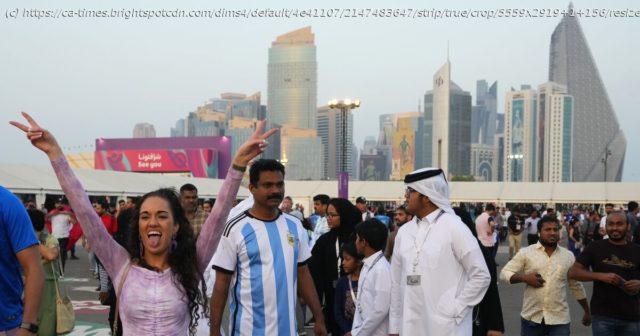Qatar’s rise on the world stage aims to achieve new heights with the World Cup, but can the country’s ambitious plans mesh with its traditional culture?
The calm before the storm is over. Now comes the deluge.
After years of anticipation and more than $200 billion in infrastructure spending, the 2022 World Cup will kick off in Qatar on Sunday. Over the following 28 days, more than 1.2 million people will flood the conservative Gulf state, which is smaller than Connecticut and has a population of about 2.9 million, three-fourths that of Los Angeles.
And there’s more than a little concern that flood will overwhelm a country that has had 12 years to prepare and still doesn’t appear ready.
“Qataris themselves are quite apprehensive about what’s coming,” said Michael Quentin Morton, an English author and historian who grew up in Qatar, Bahrain and Abu Dhabi. “They [only] have to turn the television on and see what can happen at these big football tournaments to be concerned.”
The latest reaction to that apprehension came Friday when Qatari officials demanded FIFA ban beer sales at the eight World Cup stadiums, ending a long and delicate back-and-forth between the government and global soccer’s ruling body.
The sale of alcohol, which is tightly controlled in Qatar, had been approved for select areas at stadiums and designated fan fests. The abrupt decision to renege on that agreement two days before the start of the tournament and limit sales to the fan fests caught many people off guard and suggested the royal family must have been involved.
It’s highly unlikely such a drastic move could have been made without the involvement of the popular emir, Sheikh Tamim bin Hamad Al Thani, or his brother, who has been active in planning the tournament. And it’s another salvo in a long-building cultural war between the country and its World Cup guests, who Qataris fear will pay little heed to their customs and traditions.
“We’re expecting people to respect our culture, the same thing that we do when we travel to foreign countries,” said Ibrahim Alemadi, 24, who recently opened a Mexican restaurant in sight of a World Cup stadium. “Imagine I’m coming to your house and I’m roaming around, doing whatever I want. But you have a policy in your house, you’re not comfortable with somebody doing this.
“Just respect our country. You can do whatever you want, but respect our culture.”
That is a sentiment repeated by many here.
“A lot of fans are coming with a very white-washed mentality that anything that they do is simply the right thing and anything that goes against that is backwards,” said a local journalist who did not have permission from her publisher to give her name. “Culture is culture, and it should be respected anywhere you go.”
But then asking the world to come over and have a look around has always been a major gamble for Qatar. The country is heavily influenced by Sharia law, and homosexuality and public drunkenness are forbidden, while public displays of affection and immodest dress are heavily frowned upon.
Since winning its bid for the World Cup, Qatar has also drawn widespread condemnation for its treatment of migrant laborers under the country’s kafala system, a kind of legal form of indentured servitude in which poorly paid workers have few rights.
Домой
United States
USA — mix Qatar walks tightrope between Arab values and Western norms with World Cup...






